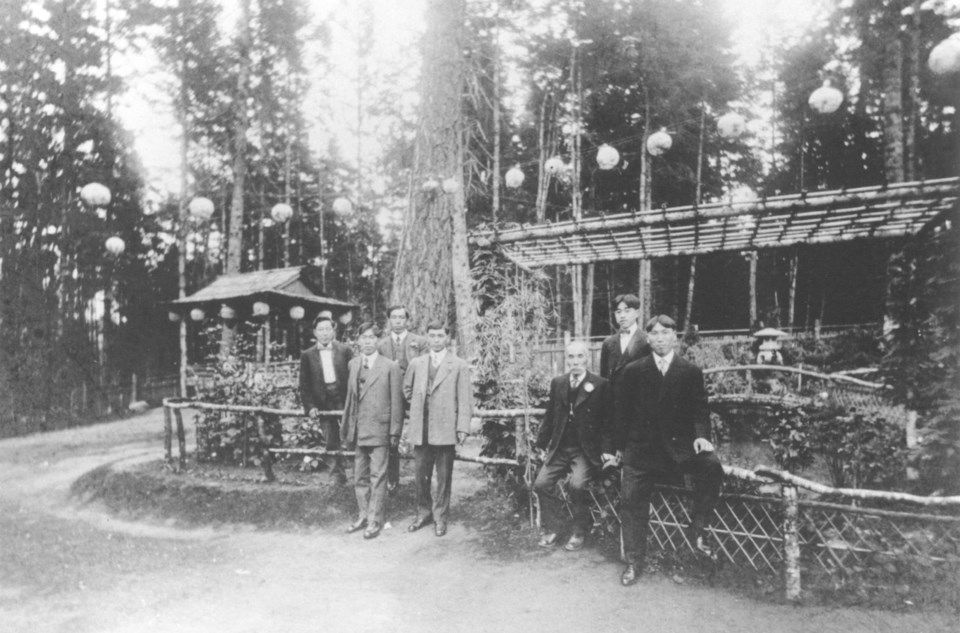There is a proposal to rebuild the Japanese teahouse that once stood in Esquimalt Gorge Park.
This proposal, spearheaded by the Victoria Nikkei Cultural Society, came about thanks to the $17-million McLoughlin Amenity Funds, a portion of which has been allotted for waterfront park improvement. Esquimalt is determining how the amenity funds will be spent, and if the Japanese teahouse will be one of the projects that is approved.
My great-grandfather, Kensuke Takata, and his brother, Hayato Takata, owned and operated the Japanese Garden in Gorge Park until the internment of Japanese-Canadians in 1942. Unfortunately, during the time the Takata family was interned, the garden, teahouse and homestead were destroyed by vandals. Like most of the Japanese-Canadians from the B.C. coast, with no home or business to return to following the end of the war, the Takatas moved east to start anew.
Despite this, the legacy of the Japanese Garden in Victoria was not forgotten.
Decades later, committed Esquimalt and Victoria residents facilitated the gradual rebuilding of a Japanese garden in Gorge Park. The ongoing effort to build a memorial teahouse in Gorge Park is a similar grassroots endeavour. The hope is that the teahouse would be a multi-purpose venue serving the needs of the entire Esquimalt community.
It would be a modern, western-style community centre on the inside, but its exterior would pay homage to the past by incorporating Japanese design elements. Historical information could be displayed within, describing the history of the Japanese teahouse that once occupied the site, as well as describing the rich Indigenous history of the Gorge waterway.
Despite its rich history and picturesque environs, it is rare to see more than a handful of people in Gorge Park at any one time. Aside from those who live in the immediate area, people are largely unaware of the park’s existence. At one time, the original Japanese gardens were a huge draw that brought a steady stream of visitors to Esquimalt. The teahouse community centre, alongside the rebuilt Japanese garden that currently exists at the Gorge, could help this park once again become a destination that would draw visitors.
After the Second World War, few Japanese-Canadian families returned to the communities they had once called home. Subsequent generations of Japanese-Canadians lost their heritage as a result. Parents whose lives had been destroyed by racist government policies chose, for the safety of their children, not to pass their language and culture to the next generation. I, like many others, grew up disconnected from my family’s heritage. My wife’s family, also Japanese-Canadian, suffered through internment as well. Through our young daughter, we are hoping to recover some of what was lost. We are endeavouring to raise her with a knowledge of Japanese culture and language that was denied to us.
Five years ago, when I moved to Victoria, it marked a homecoming of sorts for the Takata family after an absence lasting more than 70 years. It seems I could not be living in Victoria at a more auspicious time.
At the University of Victoria, the Landscapes of Injustice Project is uncovering a wealth of information related to the dispossession of Japanese-Canadians, and will soon be sharing the information with the public. Documents they’ve unearthed have been instrumental in providing historical context for the teahouse campaign. The Landscapes project also inspired a documentary team that hopes to share the story of the Gorge teahouse and the campaign to rebuild it.
On behalf of the Takata family, I would like to express gratitude to the community for bringing the teahouse project so close to fruition. Whether or not Esquimalt chooses to fund the project, it has been truly inspiring to see the community rally behind such a cause. Should Esquimalt decide to move forward with the Japanese teahouse project, it would be a setting a powerful example for the rest of the country of how communities might work to right historical injustices. It might even inspire other communities to make similar efforts.
Recently, while visiting my 93-year-old grandfather in Ontario, I had the honour of telling him about the campaign to rebuild the teahouse in Gorge Park. As a child he had played in the park, swam in the Gorge waterway and attended Lampson School in Esquimalt. Then, one day, he was forced out. His generation was made to feel unwelcome in Greater Victoria, as were all people of Japanese descent along the B.C. coast. Today, I am fortunate to live in a city that is proud of its multicultural heritage and honours its past. I have never felt more welcome.
Dillon Takata is a descendant of the original owners and operators of the Japanese Garden in Gorge Park.



